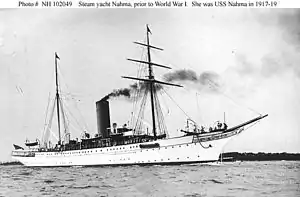USS Nahma (SP-771)
USS Nahma (SP-771), an armed yacht, was built by the Clydebank Engine and SB Co., Glasgow, Scotland in 1897 for Robert Goelet; acquired by the United States Navy on free lease from his son, Robert Walton Goelet on 21 June 1917 for use as a section patrol vessel and commissioned on 27 August 1917, Lt. Comdr. E. Friedrick in command. Nahma was the sister ship to USS Mayflower that was built at the same time on the Clyde for Ogden Goelet, brother of Robert Sr.[2]
 | |
| History | |
|---|---|
| Name: | USS Nahma |
| Builder: | Clydebank Engine and Shipbuilding Company, Glasgow, Scotland previously known as J. and G. Thomson[1] |
| Launched: | 14 February 1897 |
| Commissioned: | 27 August 1917 |
| Decommissioned: | 19 July 1919 |
| Fate: | Returned to owner |
| General characteristics | |
| Displacement: | 2,900 long tons (2,947 t) |
| Length: | 319 ft (97 m) |
| Beam: | 36 ft 6 in (11.13 m) |
| Draft: | 18 ft 6 in (5.64 m) |
| Speed: | 12 knots (22 km/h; 14 mph) |
| Complement: | 162 |
| Armament: |
|
Soon after fitting out and shakedown, Nahma reported to Gibraltar to join a group of American vessels based there and serving as convoy escorts. With these ships, she escorted vessels in the Mediterranean, as well as between the UK and Gibraltar until the end of World War I. Following the Armistice she remained in the Mediterranean for relief and quasi-diplomatic work. Operating in the Aegean and Black Seas she carried relief supplies to refugee areas; evacuated American nationals, non-combatants, the sick, and the wounded from civil war torn areas of Russia and Turkey; and provided communications services between ports. She was decommissioned at Greenock, Scotland, on 19 July 1919, and was returned to her owner.
Rum running
Nahma was later sold, renamed Istar and registered under the British flag. During the prohibition years she became part of the illicit rum running fleet off the Virginia Capes, bringing Scotch whisky and organized by Sir Brodrick Hartwell.[3] [4] Istar was later converted by Alfred Ehrenreich for use as a shark processing factory ship.[3] She was scuttled 7km of the Durban Harbour, South Africa on March 28, 1931.[5]
References
- "Clydebank Engineering and Shipbuilding Co". Grace's Guide. Retrieved 26 August 2017.
- Hofman, Erik (1970). The Steam Yachts - An Era of Elegance. New York: John De Graff Inc. pp. 100-103.
- Hofman, Erik (1970). The Steam Yachts - An Era of Elegance. New York: John De Graff Inc. pp. 103.
- "Director Visiting Rum Fleet". The Pittsburgh Gazette Times. 20 April 1923. Retrieved 27 August 2017.
- Shipwreck Database (Compiled from: Levine 1986; Turner 1988). "Underwater Heritage: Shipwreck Database:" (PDF). South African Heritage Resources Agency, (SAHRA). Retrieved 27 August 2017.CS1 maint: multiple names: authors list (link)
- This article incorporates text from the public domain Dictionary of American Naval Fighting Ships. The entry can be found here.
External links
- Photo gallery of USS Nahma at NavSource Naval History
- Photo gallery at Naval Historical Center
- YouTube wreck dive video